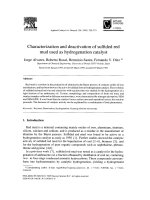- Trang chủ >>
- Khoa Học Tự Nhiên >>
- Vật lý
FLAVOR SYMMETRY AND NEUTRINO MIXING
Bạn đang xem bản rút gọn của tài liệu. Xem và tải ngay bản đầy đủ của tài liệu tại đây (215.98 KB, 5 trang )
Proc. Natl. Conf. Theor. Phys. 35 (2010), pp. 250-254
FLAVOR SYMMETRY AND NEUTRINO MIXING
PHUNG VAN DONG
Institute of Physics, VAST, 10 Dao Tan, Ba Dinh, Hanoi
Abstract. We give a review of flavor symmetries recently proposed as a leading candidate in
solving the tribimaximal neutrino-mixing form. We show how these symmetries work by taking
concrete examples: A4 symmetry in the standard model and 3 − 3 − 1 model.
I. WHY FLAVOR SYMMETRY?
Neutrinos Come in at Least Three Flavors
νe
The known
neutrino
flavors
←−−−−−−−→
e
νµ
←−−−−−−−→
µ
ντ
←−−−−−−−→
τ
The corresponding
charged-lepton
flavors
The Neutrino Revolution (1998 – · · · )
An sample of neutrino oscillation (flavor changing) is νµ −→ ντ in atmosphere.
Remark: Neutrinos have nonzero masses and mixing!
Neutrino Mixing
When W + −→ lα+ + να (lα ≡ e, µ, or τ , and α ≡ e, µ, or τ ), the produced neutrino
field (να —neutrino of flavor α) is να = i Uαi νi , where νi is neutrino of definite mass
mi (i = 1, 2, 3). The neutrino mixing matrix U ≡ (UlL )† UνL = O23 × O31 × O12 is given
in terms of Euler-angles parametrization.
The Current Experiment [PDG2010]
m221 = (8.0 ± 0.3) × 10−5 eV2 ,
| m232 | = 1.9 to 3.0 × 10−3 eV2
2
sin (2θ12 ) = 0.86(+/−)(0.03/0.04),
θ12 34o
sin2 (2θ23 ) > 0.92,
best fit θ23 45o
2
sin (2θ13 ) < 0.19
FLAVOR SYMMETRY AND NEUTRINO MIXING
There are two kinds of hierarchies, “normal” or “inverted”, depending on the sign of
positive or negative, respectively.
251
m232
Tribimaximal Mixing [Harrison-Perkins-Scott2002]
√
2/3
1/
3
0
√
√
√
= −1/√6 1/√3 −1/√ 2
−1/ 6 1/ 3 1/ 2
UHPS
(1) This form is strongly supported by the experiment because almost its values
are the best fits from the current data.
(2) In the last decade a large portion of the neutrino theories has been devoted to
derive it, but how?
Ma Connection
†
1
0√
0√
1 1
1
∼ 1 ω ω 2 0 1/√2 −1/√ 2
1 ω2 ω
0 1/ 2 1/ 2
UHPS
The first factor is Cabibbo-Wolfenstein (CW) matrix (ω = e2πi/3 ); the second one is Ma
connection.
(1) The CW matrix contains a residual symmetry Z3 , while the Ma connection
term has 2-3 reflection symmetry Z2 with zero 1-2 and 1-3 mixing.
(2) The UHPS can be obtained if there is an appropriate symmetry among flavors
containing the residual subgroups Z2 , Z3 and non-Abelian.
II. NON-ABELIAN DISCRETE SYMMETRIES
Flavor Symmetry—Group S3
The simplest group (but fails) is S3 —the symmetry group of an equilateral triangle,
which is also the permutation group of 3 objects.
Flavor Symmetry—Group A4
If the underline symmetry contains an 3 irreducible rep. responsible for three families, the simplest of which (successful) is A4 — the symmetry group of a tetrahedron, which
is also the group of even-permutations of 4 objects.
252
PHUNG VAN DONG
Flavor Symmetry—Group S4
In some models, S4 —the symmetry group of a cube, which is also the permutation
group of 4 objects, is required.
III. SOME MODELS WITH S3 , A4
S3 Model
The S3 is the smallest non-Abelian discrete group. It has 6 elements in 3 equivalence
classes, with the irreducible representations 1, 1 , and 2. Class [C1 ] : (1)(2)(3); [C2 ] :
(123), (321); [C3 ] : (1)(23), (2)(13), (3)(12). The fundamental multiplication rule is
2 ⊗ 2 = 1(12 + 21) ⊕ 1 (12 − 21) ⊕ 2(22, 11).
0 −
Let (νi , li ) ∼ 2, lic ∼ 2, (φ01 , φ−
1 ) ∼ 1, (φ2 , φ2 ) ∼ 1 , then
Ml =
0
f v1 + f v2
f v1 − f v2
0
=
mµ 0
0 mτ
0 1
1 0
.
Let ξi = (ξi++ , ξi+ , ξi0 ) ∼ 2 (with u1 = u2 ) and ξ0 = (ξ0++ , ξ0+ , ξ00 ) ∼ 1,
Mν =
hu1 h0 u0
h0 u0 hu2
=
=
a b
b a
1
√
2
1 −1
1 1
a+b
0
0
a−b
1
√
2
1 1
−1 1
.
Thus
1
U = (UlL )† UνL = √
2
1 −1
1 1
i.e. maximal νµ − ντ mixing responsible for the atmospheric neutrinos may be achieved,
despite having a diagonal Ml with mµ = mτ .
A4 Model [Ma2001,2009]
The A4 has 12 elements in 4 equivalence classes, with the irreducible representations
1, 1 , 1 , and 3. Class [C1 ] : (1)(2)(3)(4); [C2 ] : (1)(234), (2)(143), (3)(124), (4)(132); [C3 ]:
(1)(432), (2)(341), (3)(421), (4)(231); [C4 ]: (12)(34), (13)(24), (14)(23). Let ω = exp 2πi
3 ,
the fundamental multiplication rule is
3 ⊗ 3 = 1(11 + 22 + 33) ⊕ 1 (11 + ω 2 22 + ω33) ⊕ 1 (11 + ω22 + ω 2 33)
⊕3(23, 31, 12) ⊕ 3(32, 13, 21)
FLAVOR SYMMETRY AND NEUTRINO MIXING
Let (νi , li ) ∼ 3, lic ∼ 1, 1 , 1 ,
1
1
1
Ml = √
3
1
Let ξ0 = (ξ0++ , ξ0+ , ξ00 ) ∼ 1 and
a 0
0 a
Mν =
0 d
253
and (φ0i , φ−
i ) ∼ 3 with v1 = v2 = v3 , then
1
1
me 0
0
ω ω 2 0 mµ 0 .
0
0 mτ
ω2 ω
ξi = (ξi++ , ξi+ , ξi0 ) ∼ 3 with u2 = u3 = 0,
0
a+d 0
0
UνT ,
d = Uν 0
a
0
a
0
0 −a + d
where
1
0√
0√
0 1 0
Uν = 0 1/√2 −1/√ 2 1 0 0
0 0 i
0 1/ 2 1/ 2
The neutrino mixing matrix is then
√
2/3
1/
3
0
√
√
√
= −1/√6 1/√3 −1/√ 2
−1/ 6 1/ 3 1/ 2
U = (UlL )† UνL
i.e. tribimaximal mixing. This is the simplest such realization, which is consistent with
only the normal hierarchy of neutrino masses (m1 < m2 < m3 ).
A4 3-3-1 Model [Dong-Long-Soa-Hue2010]
0 +
Let (νi , li , Nic ) ∼ 3 (with L(N ) = 0), lic ∼ 1, 1 , 1 , (φ+
i , φi , φi ) ∼ 3 with v1 =
v2 = v3 , we get then
1 1
1
me 0
0
1
Ml = √ 1 ω ω 2 0 mµ 0 .
3
0
0 mτ
1 ω2 ω
Let the sextets σ0 ∼ 1 and σi ∼ 3 with u2 = u3 = 0, the active neutrinos gain mass via a
seesaw:
b 0 0
a+d 0
0
0 a d = Uν 0
UνT ,
b
0
Meff
ν =
0 d a
0
0 −a + d
where
1
0√
0√
0 1 0
Uν = 0 1/√2 −1/√ 2 1 0 0
0 0 i
0 1/ 2 1/ 2
Again, the tribimaximal mixing is obtained. This realization is consistent with arbitrary
hierarchy of neutrino masses, including normal or inverted.
254
PHUNG VAN DONG
IV. CONCLUDING REMARKS
With the application of the non-Abelian discrete symmetries such as A4 , a plausible
theoretical understanding of the tribimaximal form of the neutrino mixing matrix has been
achieved.
REFERENCES
[PDG2010] K. Nakamura et al. (Particle Data Group), J. Phys. G 37 (2010) 075021.
[Harrison-Perkins-Scott2002] P. F. Harrison, D. H. Perkins, W. G. Scott, Phys. Lett. B 530 (2002) 167.
[Ma2001,2009] E. Ma, G. Rajasekaran, Phys. Rev. D 64 (2001) 113012; E. Ma, arXiv:0905.0221 [hep-ph].
[Dong-Long-Soa-Hue2010] P. V. Dong, L. T. Hue, H. N. Long, D. V. Soa, Phys. Rev. D 81 (2010) 053004.
Received 15-12-2010.









